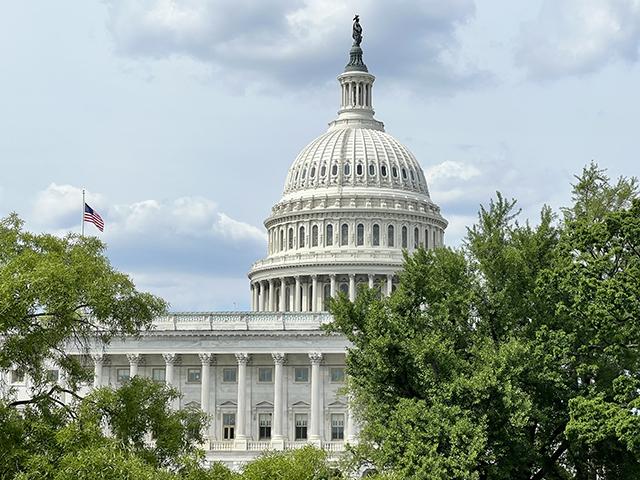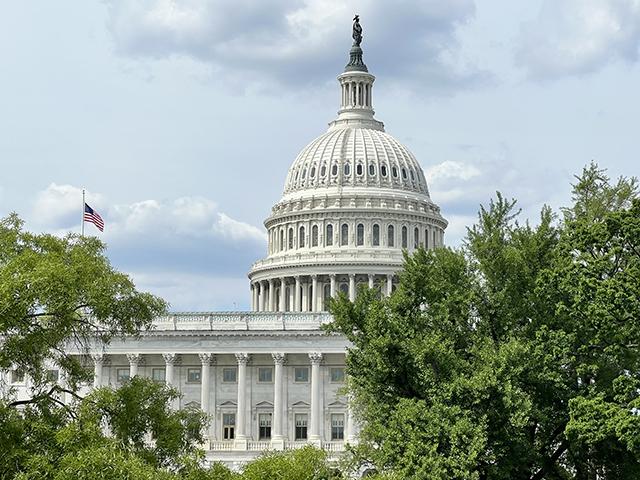Ag Policy Blog
USDA Appropriations Bill Advances on Party-Line Vote
The House Agriculture Appropriations Subcommittee on Thursday approved the fiscal year 2024 appropriations bill for the Agriculture Department, the Food and Drug Administration, the Commodity Futures Trading Commission and related agencies.
For fiscal year 2024, the subcommittee's discretionary allocation is $25.3 billion, about $532 million less than the current fiscal year. The big change is that the GOP plan funds a big chunk of USDA -- about $8.15 billion -- by essentially shifting those dollars from USDA money received from American Rescue Plan and the Inflation Reduction Act.
The subcommittee passed the bill on a voice vote, with Republicans quietly approving it and Democrats shouting "No."
The markup was unusual in that the subcommittee usually reaches agreement in advance of the markup, but this year the Republicans made big cuts to farm and nutrition programs to which the Democrats objected vigorously.
Earlier in the week, Agriculture Secretary Tom Vilsack said of the Appropriations bill, "The proposal is pathetic, it is punitive, and it is petty." Vilsack added, "While these individuals continue to posture and put forth non-serious proposals, the U.S. Department of Agriculture is charging ahead implementing policies and making investments that America's farmers, rural communities, and families have been promised and are counting on to continue to rebuild from the pandemic, natural disasters and other challenges outside of their control. It is hard to see the logic in undermining such goals. People deserve better, and USDA remains committed to improving the livelihoods, health and economic opportunity for all Americans."
In a statement criticizing the Appropriations Subcommittee, House Agriculture Committee ranking member Rep. David Scott, D-Ga., said, "The proposal by House Republican appropriators to slash over $6.25 billion from Agriculture Committee funds is a direct assault on rural communities across America."
Scott added, "House Republicans say they want to cut spending, but this plan is not strategic or reasonable in scope -- it simply takes money from programs already benefitting our rural constituents to mask the cuts our colleagues would otherwise be forced to show. And this at the same time that the Agriculture Committees are working on the new farm bill."
The Democratic-leaning National Farmers Union said it opposes the bill because it includes "harmful provisions that would prevent USDA from completing long-awaited Packers and Stockyards Act rules to protect family farmers and ranchers from abuses of market power by the meat industry.
NFU President Rob Larew said, "Several proposals in this bill damage the farm economy, prevent us from tackling climate change, and harm our communities. We urge Congress to reject these changes and to make fairness for farmers a priority."
Before the vote, committee leaders made impassioned statements about the bill.
P[L1] D[0x0] M[300x250] OOP[F] ADUNIT[] T[]
Rep. Andy Harris, R-Md., the subcommittee chairman, said, "As Americans know all too well, our country continues to face record inflation driven by the reckless spending of the Biden administration."
"We simply cannot continue down this path of providing large sums of money with no accountability. This bill takes the same approach American families take every day -- they have to do more with less under the Biden economy.
Harris added, "This legislation rejects the Biden administration's unrealistic proposed spending levels that are detached from the dire fiscal reality our country faces. It also rejects the administration's continued push to bloat the federal bureaucracy by halting new hires in the Washington, D.C. office to instead focus on hiring the USDA workforce outside the beltway, in the offices that directly serve and support rural America."
Rep. Sanford Bishop, D-Ga., the subcommittee ranking member, responded that in the past on markup days he has followed the Biblical admonition "this is the day that the Lord has made. Let us rejoice and be glad in it," but that this year "it is very difficult, despite my faith, to rejoice in this markup because today this bill turns its back on rural America."
"It is a retreat from our most vulnerable communities. This bill really makes it more difficult to implement the purpose and to have a level playing field for all Americans," Bishop said.
Rep. Rosa DeLauro, D-Conn., the ranking member on the full Appropriations Committee, said, "We are at the third subcommittee markup for the 2024 appropriations process under a majority that has not established a discretionary allocation for the committee and has yet to reveal its 12 subcommittee allocations."
DeLauro said, "The cuts in the bill are harmful, including slashing the Women, Infants, and Children (WIC) program by $500 million, cutting the Renewable Energy for America Program by $500 million, gutting investments in rural electric co-ops for clean energy and energy efficiency by $3.25 billion, eliminating loans that serve as a financial lifeline that has already helped more than 20,000 distressed farmers [by] keeping hardworking farmers from going into foreclosure."
DeLauro also said the bill is "full of policy riders that focus more on social policy issues catering to the ideological extreme than helping farmers and Americans everywhere who rely on funding in this bill for the food they eat and the medicines they take."
Harris also pointed out that the bill limits Agriculture Secretary Tom Vilsack's use of the Commodity Credit Corporation, USDA's line of credit at the Treasury.
When Vilsack was secretary during the Obama administration, Congress limited the secretary's authority, but the discretion to use it was restored when Sonny Perdue, President Trump's Agriculture secretary, said he needed it to make payments to farmers who lost money after Trump imposed tariffs on Chinese products and the Chinese retaliated by limiting U.S. agricultural imports.
"By removing the Ag secretary's discretionary use of the Commodity Credit Corporation to fund unauthorized non-emergency programs, this legislation saves $1 billion in fiscal year 2024 alone," Harris said.
"Given that USDA used these discretionary powers to spend $2.5 billion and $6.6 billion the last two fiscal years, respectively, I would submit to my colleagues the real savings to taxpayers of taking these authorities away are even higher."
Bishop, in a reply said, "The CCC is a tool to benefit agriculture producers, no matter which party is in the White House. The only folks that suffer when any administration is not allowed to use the CCC at its discretion are our ag producers," Bishop said.
The full House Appropriations Committee is expected to take up the Agriculture bill next week.
Also see, "House Ag Funding Bill Would Block Livestock Marketing Rules," https://www.dtnpf.com/…
DTN Ag Policy Editor Chris Clayton contributed to this report.
Jerry Hagstrom can be reached at jhagstrom@nationaljournal.com
Follow him on Twitter @hagstromreport
(c) Copyright 2023 DTN, LLC. All rights reserved.





Comments
To comment, please Log In or Join our Community .